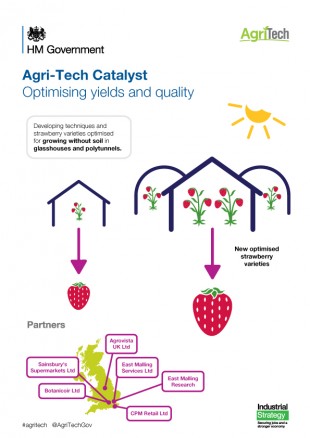I recently had a very ‘fruitful’ visit to one of our new Agri-Tech Catalyst projects and learned all about the fascinating future of strawberries. East Malling Research (EMR) in Kent are leading the partnership to identify new varieties of strawberry that are more resource-use efficient.
Strawberries and other fruits are increasingly grown in substrates (other materials on which they can live) rather than soil, partly as a result of soil-based diseases which have left large areas of often scarce land unusable. EMR are using coir as a substrate, which is basically the brown fluffy husk of coconuts, and a waste product of the coconut industry. While soil is variable in its nutritional content and value, growing the plants in coir and ‘feeding’ them via small irrigation tubes means they can be given the exact nutrition they need.
The £1 million Agri-Tech Catalyst project being led by EMR aims to develop strawberries that are suitable for this type of substrate production – those that are more resource-use efficient from the root up to the leaves, ultimately providing better yields, fruit quality and to improve sustainability for the grower and UK market, as demonstrated in this infographic:
Abi Johnson, a Strawberry Breeder at EMR, looks at the characteristics of the superior plants and works closely with molecular geneticists to analyse this data and better select plants that will be more suitable for future use. Abi says that this close working relationships between breeders and geneticists is what makes the project so innovative: “In the past, breeders selected subjectively, visually looking at yield and quality. But now, working together, we can pinpoint responsible genes and identify varieties much more easily that will be more resource efficient and sustainable in the future.”
Over the first two years of the project, Abi and her colleagues will be focussing on the root development and architecture to analyse nutrient use efficiency. They will then look at fruit quality and eventually be able to identify the products that have all the desired characteristics and be able to bring these to the retail market. Not only will this technology enable greater productivity, it could reduce imports and increase sustainability of strawberry production out of season.
Abi also commented that they will be studying, not just the strawberry plant, but microbes for the first time: “It’s a very exciting time in agriculture because new technology is emerging all the time that we’re able to apply to our area. This is the first time we’ve been able to look at what’s going on below the soil – before we just didn’t take the interaction of different microbes into account, which we can do now.”
The partnership approach has been essential to the success of EMR’s bid to the Agri-Tech Catalyst. EMR had an idea of what they wanted to do and identified different partners who could be involved, and benefit from doing so. These partners represent the whole chain – from breeding to the supermarket. Peter Czarnobaj, Product Technologist (Soft Fruit) from Sainsbury’s (one of the partner organisations) says that having such a range of partners involved “reduces the risks of developing new technology and gives it every chance to succeed. It gives everyone the confidence that the end use is clearly defined and worthwhile.”
Competition for Agri-Tech Catalyst funding was fierce, but EMR are very pleased they put the hard work into the application process, which supported them to bring together their essential range of partners.
You can hear more about the project from the team themselves in this short video.
To find out more about other Agri-Tech Catalyst projects, see the press notices below, and to be the first to hear when new projects are announced follow us on Twitter (@AgriTechGov) or subscribe to our newsletter.
Agri-Tech Catalyst Press Notices
Round 1: Early and Late Stage Research Projects
Round 1: Industrial Research Projects
Round 2: Early and Late Stage Research Projects
Nancy Bailey - Agri-Tech Strategy Team, BIS


Recent Comments